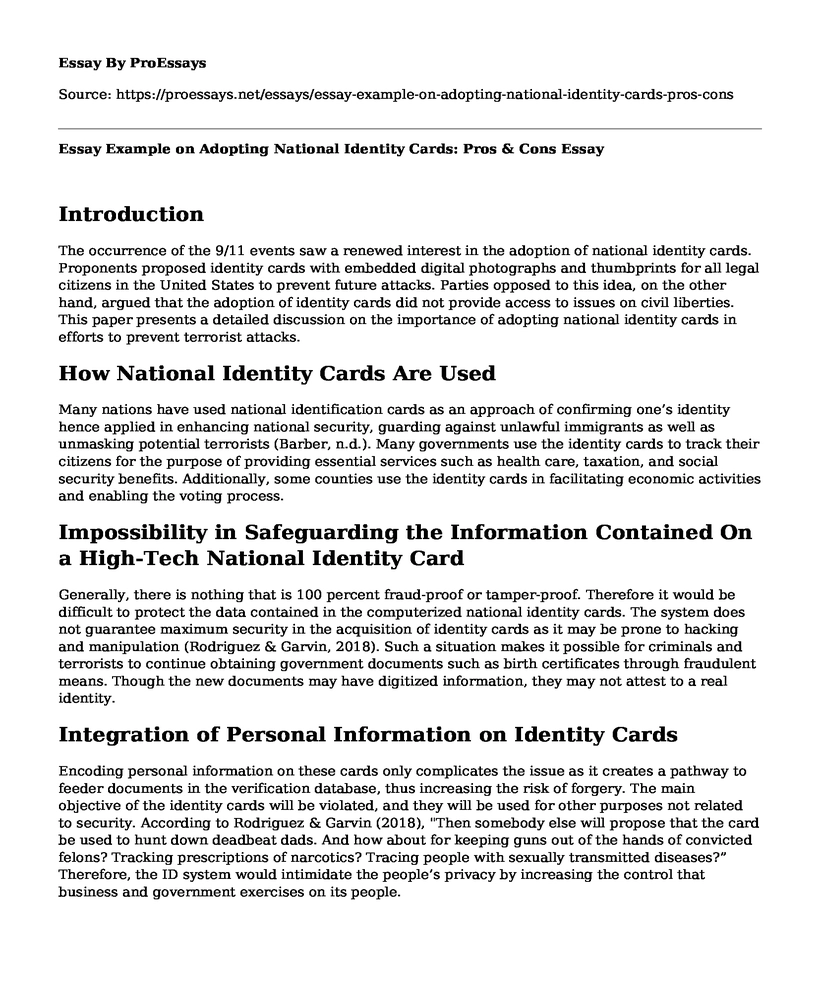Introduction
The occurrence of the 9/11 events saw a renewed interest in the adoption of national identity cards. Proponents proposed identity cards with embedded digital photographs and thumbprints for all legal citizens in the United States to prevent future attacks. Parties opposed to this idea, on the other hand, argued that the adoption of identity cards did not provide access to issues on civil liberties. This paper presents a detailed discussion on the importance of adopting national identity cards in efforts to prevent terrorist attacks.
How National Identity Cards Are Used
Many nations have used national identification cards as an approach of confirming one’s identity hence applied in enhancing national security, guarding against unlawful immigrants as well as unmasking potential terrorists (Barber, n.d.). Many governments use the identity cards to track their citizens for the purpose of providing essential services such as health care, taxation, and social security benefits. Additionally, some counties use the identity cards in facilitating economic activities and enabling the voting process.
Impossibility in Safeguarding the Information Contained On a High-Tech National Identity Card
Generally, there is nothing that is 100 percent fraud-proof or tamper-proof. Therefore it would be difficult to protect the data contained in the computerized national identity cards. The system does not guarantee maximum security in the acquisition of identity cards as it may be prone to hacking and manipulation (Rodriguez & Garvin, 2018). Such a situation makes it possible for criminals and terrorists to continue obtaining government documents such as birth certificates through fraudulent means. Though the new documents may have digitized information, they may not attest to a real identity.
Integration of Personal Information on Identity Cards
Encoding personal information on these cards only complicates the issue as it creates a pathway to feeder documents in the verification database, thus increasing the risk of forgery. The main objective of the identity cards will be violated, and they will be used for other purposes not related to security. According to Rodriguez & Garvin (2018), "Then somebody else will propose that the card be used to hunt down deadbeat dads. And how about for keeping guns out of the hands of convicted felons? Tracking prescriptions of narcotics? Tracing people with sexually transmitted diseases?” Therefore, the ID system would intimidate the people’s privacy by increasing the control that business and government exercises on its people.
Possible Advantages of National Identification Cards
The adoption of national identification cards would spread the convenience of registering with the government in all social sets and combating identity theft. As a result, this would see an end to social profiling as minority groups will not be subjected to undesirable treatment (Barber, n.d.). The national identification cards would restructure the government's administration, especially in providing essential services and management of immigration. On the higher end, if implemented by the private sector, the system would serve to offer a vital link between governmental and commercial institutions.
Possible Disadvantages of National Identification Cards
The law-abiding Americans will experience diminished privacy and freedom. All their personal information is subject to being tracked since many parties have access to this data. The system is likely to lead to a high intrusiveness as employers and service providers will integrate the identity cards into their payment and security systems. Such a move will create a nation where people's movement is being monitored through the "internal passports" (American Civil Liberties Union, 2020). Identification cards would also foster new kinds of harassment and discrimination on persons perceived to sound or look foreign hence the need to prove to be legal Americans continually.
Conclusion
In a situation the national identification system had been implemented before 11th September 2001, it would still not have stopped the extremist attacks. This is because the perpetrators had valid drivers’ licenses. Identification cards are as good as the supporting documentation. The IDs would still be fraudulent if the other documents had been forged.
References
American Civil Liberties Union. (2020). Five problems with national ID cards. https://www.aclu.org/other/5-problems-national-id-cards
Barber, G. (n.d.). Would national ID cards increase safety and preserve civil liberties? ACLU of New Jersey | ACLU of New Jersey. https://www.aclu-nj.org/theissues/opengovernment/wouldnationalidcardsincrea
Rodriguez, A., & Garvin, G. (2018, April 30). What's wrong with a national ID card? Government Technology State & Local Articles - e.Republic. https://www.govtech.com/magazines/gt/Whats-Wrong-With-a-National-ID.html
Cite this page
Essay Example on Adopting National Identity Cards: Pros & Cons. (2023, Aug 08). Retrieved from https://proessays.net/essays/essay-example-on-adopting-national-identity-cards-pros-cons
If you are the original author of this essay and no longer wish to have it published on the ProEssays website, please click below to request its removal:
- Physical Abuse in Monica L. McCoy Essay
- Olympic Opening Ceremonies Essay Example
- Essay Sample on The Portrayal of Women in Media
- Essay Example on Ethiopia: Scarcity-Driven Challenges in Rural Areas
- Essay Sample on Avoid Bias in Performance Appraisals: Tips & Examples
- Animal Testing: Unethical and Inhumane Practice - Essay Sample
- Feminist Movement: Advocating for Gender Equality & Rights - Essay Sample







